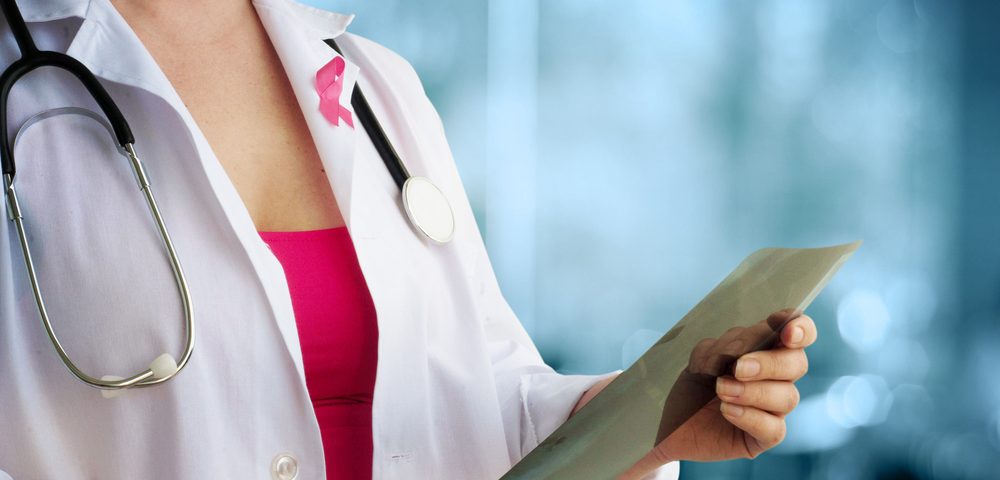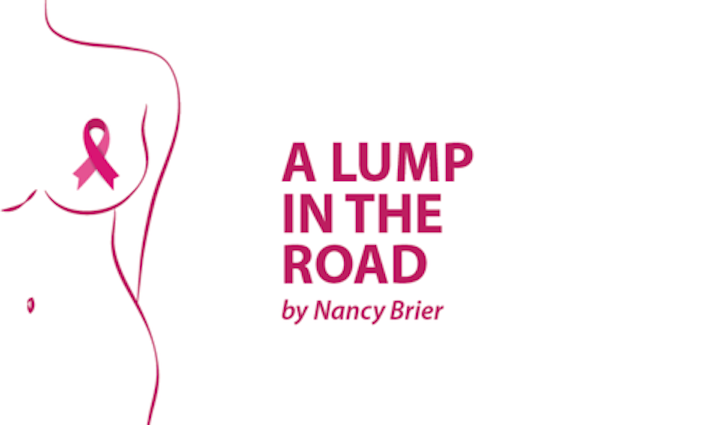“Go ahead, feel them,” I said to the young man sheepishly looking at my breasts. He was clean-cut, awkward-looking, and at least 20 years younger than I am. And I could tell he really wanted to cop a feel.
The truth is, I wanted him to, if for no other reason than it would be way better than watching him hide in the corner. “It’s OK,” I said again. “That is, if it’s OK with her.” I glanced over my shoulder at an authoritative-looking woman who clearly was in charge of the whole situation.
“Fine with me,” she said.
The tenderfoot’s face lit up and the gaggle of women huddled around me parted like the Red Sea.
Tentatively, with the gentility of a monk, the young man’s fingers touched my skin. “It’s this one,” I said, indicating my right breast. “See if you can find it.”
He looked at the ceiling and concentrated. At that moment, it was like he was no longer in the room. He was somewhere else, maybe in a class or a laboratory, and he started massaging me with textbook precision. Suddenly, his demeanor changed.
“Right here,” he said.
“You found it.” I didn’t point out to him that my tumor is huge, that my breasts are small, and that a trained monkey could probably have found it, too.
“I’ve never actually felt a tumor before,” he said, meeting my eyes. “Thank you.”
I was at Stanford Health Care being prepped for tattooing.
No, I wasn’t getting a butterfly on my ass or the Chinese symbol for hope on my forearm. I’d be getting seven pin-prick sized tattoos that would tell radiation therapists where to zap me with life-saving X-rays after I finished chemo and surgery. In the meantime, a lot of people looked at and felt my naked body.
The first time I arrived at Stanford, what seemed like an entire marching band entered my small exam room along with a physician who looked a lot like Marcus Welby, the famous, good-looking MD my parents watched on television when I was a kid.
It wasn’t an actual marching band — they didn’t have uniforms or instruments — but there were so many of them that they could have pulled off a few formations. All of them were students. And they all needed me so they could learn.
A few weeks before I arrived for that exam, a rural doctor had performed a core biopsy that hadn’t gone well, and I was still black and blue. “You look pretty beat up,” Dr. Welby told me that day as he munched on a handful of almonds. “You OK?”
His students looked at him with stars in their eyes, and he extolled the nutritional value of almonds while he fingered my swollen right breast. “Walnuts are even better, doctor,” I said, making a mental note to bring him nuts from my family’s walnut farm. (And yes, walnuts are better than almonds.)
Dr. Welby asked me a lot of questions and then posed a few to his students. It was a little like a party without the booze or fancy appetizers, and of course, the shadow of cancer cast a pall on the overall vibe. But I appreciated the expertise in the room and the chance that I could offer something of value in my compromised position.
I want these students to be good at their jobs. I want their time in this room with me to be worthwhile, I thought.
By encouraging these students to feel my breasts, by candidly answering their questions, and by shamelessly acknowledging my bravery and fear, my hope is that they’ll excel in their future work. I want them to be very familiar with the condition that almost killed me.
The morning after my husband felt my lump, I saw a doctor. “Don’t worry about it,” she said. “It doesn’t meet the characteristics of cancer.”
But I did worry about it, and it did meet the characteristics of cancer: triple-negative, advanced, spread to my lymph nodes and sternum. Without treatment, I’d have been dead in a matter of months.
I’m so blessed to have had the wherewithal to double-check this doctor’s carelessness. Maybe she needed a patient like me when she was still studying for her career, or maybe I just got lucky.
But either way, if a student wants to feel my body, my answer is always going to be yes. And I hope yours will be, too, even if spring break is just a distant happy memory.
***
Note: Breast Cancer News is strictly a news and information website about the disease. It does not provide medical advice, diagnosis, or treatment. This content is not intended to be a substitute for professional medical advice, diagnosis, or treatment. Always seek the advice of your physician or other qualified health provider with any questions you may have regarding a medical condition. Never disregard professional medical advice or delay in seeking it because of something you have read on this website. The opinions expressed in this column are not those of Breast Cancer News, or its parent company, BioNews Services, and are intended to spark discussion about issues pertaining to breast cancer.


